
Archaeological and Anthropological Sciences
metrics 2024
Exploring Humanity Through Science and History
Introduction
Archaeological and Anthropological Sciences is an esteemed peer-reviewed journal published by Springer Heidelberg, specializing in the interdisciplinary fields of archaeology and anthropology. Since its inception in 2009, this journal has established itself as a pivotal resource for researchers and professionals, featuring cutting-edge studies that bridge the gap between the sciences and humanities. With its impressive 2023 Q1 rankings in Anthropology and Archaeology categories, the journal stands out in the Scopus landscape, ranking within the top 5% of its field—Rank #18/413 in Archaeology (Arts and Humanities) and Rank #28/502 in Anthropology. This is complemented by its commitment to disseminating high-quality research to a global audience, despite being a non-Open Access publication. The journal's scope encompasses innovative methodologies, archaeological findings, and anthropological insights that are vital for advancing knowledge and fostering academic discourse. As it moves toward its upcoming converged years, Archaeological and Anthropological Sciences continues to solidify its reputation as a key forum for scholarly exchange in these fields.
Metrics 2024
 0.97
0.97 2.10
2.10 2.20
2.20 42
42Metrics History
Rank 2024
Scopus
IF (Web Of Science)
JCI (Web Of Science)
Quartile History
Similar Journals

Deltion of the Christian Archaeological Society
Bridging Disciplines: Understanding Faith Through ExcavationDeltion of the Christian Archaeological Society (ISSN: 1105-5758, E-ISSN: 2241-2190), published by the Christian Archaeological Society in Athens, Greece, stands as a pivotal source of scholarly work within the realm of Christian archaeology. This journal is dedicated to disseminating high-quality research that promotes the understanding of Christian history, heritage, and archaeological practices. Though it operates under traditional access options, it provides a comprehensive platform for researchers and professionals alike, fostering dialogue and collaboration within the archaeological community. With a commitment to advancing knowledge, the Deltion aims to support both established scholars and emerging voices, reinforcing the significance of archaeology in interpreting religious narratives and cultural contexts. Researchers, students, and professionals interested in the intersections of archaeology, history, and theology will find this journal an invaluable resource in their scholarly pursuits.

ARCHAEOLOGY IN OCEANIA
Illuminating the Mysteries of the Pacific's Ancient CulturesARCHAEOLOGY IN OCEANIA, published by Wiley, is a leading journal that delves into the rich and diverse archaeological landscape of the Pacific region. With a commitment to advancing knowledge in anthropology and archaeology, this esteemed publication has been pivotal in shaping scholarly discussions since its inception in 1966. Spanning generations of research, it has seen converged years of publication from 1966 to 1980 and from 2002 to 2024. With an impressive Scopus ranking placing it in the top quartiles across multiple categories - including Q2 in Anthropology and Q1 in Archeology (arts and humanities) - the journal distinguishes itself as a must-read for researchers, professionals, and students alike. Although it operates on a subscription model, its rigorous peer-reviewed articles and comprehensive studies contribute significantly to understanding the past of Oceania, making it an essential resource for those invested in this vibrant field of study.
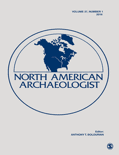
NORTH AMERICAN ARCHAEOLOGIST
Decoding the Layers of North American HistoryNORTH AMERICAN ARCHAEOLOGIST, published by SAGE PUBLICATIONS INC, is a prestigious journal that serves as an essential resource for professionals and scholars in the field of archaeology. With its ISSN 0197-6931 and E-ISSN 1541-3543, the journal aims to disseminate high-quality research that contributes to the understanding of the historical and cultural significance of North America from prehistory to the present. As of 2023, it holds an impressive Q2 category in Archaeology and ranks within the Q1 tier for Archaeology (arts and humanities), positioning it among the top journals in its field. Its Scopus rankings further emphasize its significance, reflecting a commendable percentile standing that underscores its influence in both arts and humanities and social sciences. The journal is committed to offering a platform for innovative research and scholarly discussion, making it invaluable for researchers, professionals, and students dedicated to advancing archaeological knowledge.

Magallania
Exploring Social Dynamics from the Heart of MagallanesMagallania is a pioneering open-access journal published by UNIV MAGALLANES, dedicated to advancing scholarly discourse in the field of Social Sciences. Since its inception in 2005, the journal has provided a platform for original research, critical reviews, and insightful analyses that address diverse issues affecting society in both local and global contexts. Based in Punta Arenas, Chile, Magallania has established itself as an essential resource for researchers, professionals, and students alike, particularly in its current position within the Q2 category of Social Sciences (miscellaneous) as of 2023. With an ongoing commitment to quality and accessibility, the journal aims to foster interdisciplinary dialogue and promote knowledge exchange, all while contributing to a deeper understanding of social dynamics and challenges. Magallania is indexed in Scopus, ranking competitively in the field; it reflects the dynamic scholarly environment that characterizes the vibrant region of Magallanes and beyond.
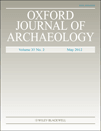
Oxford Journal of Archaeology
Fostering Collaboration in the Archaeological CommunityOxford Journal of Archaeology is a prestigious peer-reviewed journal published by WILEY, dedicated to advancing the field of archaeology through innovative research and insightful discourse. Established in 1982, this journal has become a vital resource, showcasing high-impact studies that resonate within the arts and humanities, as well as interdisciplinary fields such as geography and planning. With an impressive Q1 ranking in both Archaeology and Arts & Humanities categories, and a Q2 ranking in Geography, Planning, and Development, the journal consistently maintains its reputation for excellence—evidenced by its ranking in the 81st percentile within the Scopus Arts and Humanities Archaeology category. The Oxford Journal of Archaeology not only provides scholars, professionals, and students with access to cutting-edge archaeological research but also encourages collaboration and dialogue among a diverse academic community. Although the journal does not currently offer Open Access, it remains a crucial platform for those seeking to expand their knowledge and impact in this dynamic field.

Relaciones
Advancing Knowledge, Enriching Perspectives.Relaciones is a prestigious open-access journal published by the SOC ARGENTINA ANTROPOLOGIA, dedicated to the field of anthropology. Since its inception in 1937, this journal has served as a vital platform for disseminating innovative research and insights within the social sciences community. With both its print (ISSN: 0325-2221) and online (E-ISSN: 1852-1479) formats, Relaciones ensures widespread accessibility, empowering researchers, professionals, and students to engage with contemporary anthropological discourse. The journal aims to foster critical discussions that not only reflect on cultural and societal issues but also contribute to theoretical advancements in anthropological methodologies. By maintaining a commitment to quality and open access, Relaciones plays a crucial role in shaping the future of anthropology in Argentina and beyond, encouraging scholarly collaboration and enriching the academic landscape.

Interdisciplinaria Archaeologica-Natural Sciences in Archaeology
Empowering Global Dialogue in Archaeological SciencesInterdisciplinaria Archaeologica-Natural Sciences in Archaeology is a distinguished journal published by UNIV HRADEC KRALOVE, dedicated to the exploration and integration of natural sciences within the context of archaeology. With an impact factor that reflects its strong footing in the academic community, this journal provides a vital platform for interdisciplinary research, fostering collaboration among archaeologists, scientists, and scholars from diverse fields. Since its transition to Open Access in 2010, it has made significant contributions to the accessibility of research findings, connecting global audiences interested in the archaeological sciences. Based in the Czech Republic, the journal has achieved impressive rankings—placing in the Q2 quartile across both Archaeology and Arts and Humanities categories, as well as respectable standings in the Social Sciences domain. Over its converged years from 2014 to 2024, it has published cutting-edge studies that enhance our understanding of past human behaviors through scientific methodologies. Researchers, professionals, and students are encouraged to engage with the journal’s content to contribute to and benefit from the vibrant discourse in archaeological science.
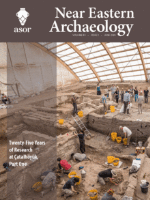
NEAR EASTERN ARCHAEOLOGY
Uncovering the Past, Shaping the FutureNEAR EASTERN ARCHAEOLOGY, published by University of Chicago Press, is a premier journal dedicated to the field of archaeology, particularly focusing on the rich cultural heritage and archaeological findings of the Near East. With an ISSN of 1094-2076 and an E-ISSN of 2325-5404, this esteemed publication provides a vital platform for scholars and practitioners to share their research, insights, and discoveries. The journal holds an impressive ranking in the Q1 quartile for both Archaeology and History in 2023, reflecting its significant impact within these fields and a robust history of scholarly contribution. The journal has been pivotal in shaping discussions around archaeological methodology, theory, and contemporary issues from 2002 to 2024, as it continues to reach a wide audience through various access options. With Scopus rankings placing it in the top percentiles for both History and Archaeology, NEAR EASTERN ARCHAEOLOGY represents an essential resource for researchers, professionals, and students alike, fostering the exploration and understanding of the region's archaeological narrative.
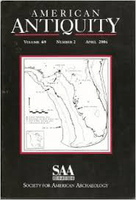
AMERICAN ANTIQUITY
Shaping the Future of Archaeological Discourse.AMERICAN ANTIQUITY, published by Cambridge University Press, stands as a premier journal in the fields of archaeology, arts and humanities, history, and museology. With an enduring legacy since its inception in 1935, this journal has consistently ranked in the Q1 category across several disciplines, reflecting its significant impact and authority in shaping contemporary scholarly discourse. It boasts impressive Scopus rankings, placing it in the 99th percentile for archaeology and history, which underscores its critical role in advancing research and understanding of American archaeology and related fields. Although it does not currently offer open-access options, the journal remains a vital resource for researchers, professionals, and students seeking high-quality, peer-reviewed content. As it converges toward 2024, AMERICAN ANTIQUITY continues to foster innovative scholarship and preserve knowledge, making it an essential reading for anyone invested in the exploration of cultural heritage and historical narratives.
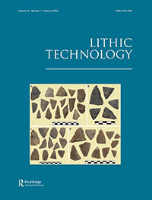
Lithic Technology
Connecting Scholars to the Art of Stone Tool CraftingLithic Technology is a premier international journal published by Routledge Journals, Taylor & Francis Ltd, dedicated to advancing the field of lithic studies in archaeology and anthropology. Established in 1977, this prestigious journal has established itself at the forefront of research concerning stone tool technology, providing a vital forum for scholars to share groundbreaking findings and methodologies. With an impressive Q1 ranking in both Archaeology and Anthropology, and indexed within the 91st percentile in its respective categories by Scopus, Lithic Technology is recognized for its significant contributions to the understanding of human prehistory and material culture. The journal features a diverse array of articles, from theoretical approaches to practical case studies, ensuring relevance to contemporary archaeological discourse. Though not an open-access publication, its meticulous peer-review process guarantees the highest quality of scholarship, making it an indispensable resource for researchers, professionals, and students eager to expand their knowledge in the rigors of lithic analysis.